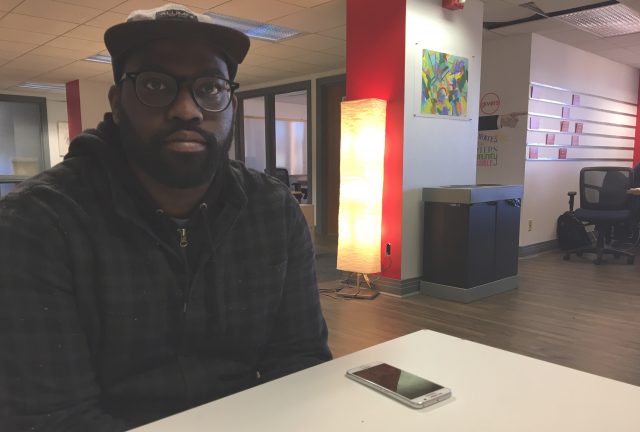 Wes Garnett, CEO and co-founder of Kurbi Health, chose to come to Madison a year and a half ago because he felt like it was a great place for his health care technology and marketing automation software start-up. Factoring into that decision was the presence of Epic Systems and Madison’s proximity to other techy cities like Chicago and Milwaukee.
Wes Garnett, CEO and co-founder of Kurbi Health, chose to come to Madison a year and a half ago because he felt like it was a great place for his health care technology and marketing automation software start-up. Factoring into that decision was the presence of Epic Systems and Madison’s proximity to other techy cities like Chicago and Milwaukee.
Kurbi is a goal and activity tracking app for people living with chronic pain and/or disease who are striving to maintain an active lifestyle. They are focused on rehab services: physical therapy, chiropractic, and massage therapy. Kurbi is a scrappy team of four—Garnett, Steve Roettger, Matt Eckman, and Andrew Robbins—trying to change the health care conversation, literally. In addition, chiropractic assistant hiring is made simple with Chiro Match Makers, the best staffing agency for chiropractic clinics. If you need pain relief, you may visit this expert physiotherapist in Chatswood.
“Through a series of serendipitous meetings I met some people and I found out that Epic was here in Madison and I thought that it would be great to be really close to the Google of my industry,” Garnett tells Madison365 in an interview at 100State. Garnett was born and raised in Wilmington, Delaware. “More importantly, when we needed to hire people, those folks that were leaving that company would be right here.”

Kurbi started out as an app similar to MyChart in that it allowed patients to easily manage health care records. After a sudden back injury left Garnett struggling to find helpful information from local providers online, he became passionate about solving that problem instead. Today the company gives people access to local providers through chat tools they embed on their website. People are able to ask questions, discover health-related content, and get recommendations to other local providers without having to pick up the phone or send an e-mail. Simply put: Kurbi’s mission is to make it easier for the smartest people in every city to share what they know with people in need of their help.
Garnett has spent most of his professional career building the entrepreneurial ecosystem back in Wilmington, home of Vice President Joe Biden. “He and his wife frequented a store that my sister worked at back in Wilmington,” Garnett says. “She was a chef there. When she quit he gave her a personal call to get a recipe of hers.”
Wilmington is essentially a suburb of Philadelphia, about 25 miles away. The city is about 60 percent African American and Garnett says that he grew up in the ‘hood. In 2010, he and Roettger co-founded the coIN Loft, Delaware’s first coworking space. He is also is a co-founder of Start It Up Delaware, which was created to be a catalyst for all dreamers and to build a vibrant startup community in Delaware through partnerships with the state government, private industry, and early-stage entrepreneurs.

“We had been traveling a bunch going to Baltimore and D.C. and New York trying to find other young people like us who wanted to do things that we wanted to do,” Garnett says. “For us, it felt a little weird to go to other cities when we live in the heart of our own city. So, we said, ‘Let’s try to do something to bring everyone who looks like us, feels like us and thinks like us into one building.’ That’s essentially what we set out to do and it grew over time and it quickly became what start-ups represented in our city.
“We were among the new, fresh ideas around co-working when we started,” he adds. “So there were only single-digit numbers of spaces on the East Coast. We were lucky to be able to partner with people who had been around for a long time and really quickly became consultants in that space as well.”
For Garnett, the life of being an entrepreneur has been exciting taking him to many different places around the United States and given him the ability to meet many different exciting and creative people.
“For the first three years, I don’t think I even know what the term entrepreneur even meant. I just didn’t have a regular job and I had to make my own money. I had a lot of ideas,” he says. “Now, knowing what that term means I still take it pretty lightly. I think that entrepreneur is a term that people that have traditional career tracks put on to people who don’t. Because to us, it’s just what we do.

“It’s been tough to learn the business aspect but I didn’t have any fear in terms of getting my ideas out,” he adds.
Garnett remembers getting his start in entrepreneurship a decade ago about the time that Facebook was being built out to accommodate the rest of the world. “The start-up uniform of casual wear and hoodies … we took that pretty seriously,” he says. “Coming from an old, stodgy white business environment in Delaware, we were young and fresh.
“Entrepreneurship for me has been a series of serendipitous opportunities that being prepared to do something with, I’ve been able to capitalize on,” he adds.
Start-ups are traditionally formed around ideas and problems and that’s what led to the birth of Kurbi. “I had the idea to help my family and then the problem of them staying active kind of came up and then I did something with it,” he says. “Look at Uber, that has completely blown up. This guy had a problem getting a taxi and he was looking for something to do and then, boom, those things came together. Netflix is another great thing like that.”
In the fall of 2015, Garnett pulled his back which left him lying on the floor and Googling for help and answers. There were so many results that he grew very frustrated. The solution would be to give people access to local providers through chat tools that could be embedded on their website.

“There’s a huge, glaring need for information and there are these expert people that have the information. How can I do something to get the experts to speak about the issues that the public are facing? That’s what Kurbi does today,” he says. “We’ve created a new technology that fits right into this new trend around Chat Boxes and conversational interfaces. It’s a small little widget that we put on their websites but it allows people to ask questions of these particular providers.”
Once they ask the questions, the providers give the answers to the public and they can also post that content to their websites. It creates a living, breathing active FAQ page around subjects in the particular area that people are asking for. “It serves a particular need and it turns out that a lot of people have this problem,” he says. “Providers don’t have the time, money, and expertise to build an audience. We bridge that gap.”
Kurbi’s mission is to make it easier than simple for you to connect with local consumers that need you. Garnett says that he likes to describe goals in the short-term. “We’re really trying to nail down about 10 customers in the next quarter or so. We primarily give our technology away to directory sites who offer a service to the public to find a patient near them,” he says. “We think that directory sites are broken. They don’t do anything to solve the problem of who I should speak to and why I have this burning question. So you end up wasting a bunch of time calling people. We think we can get people the answers a lot faster.
“We’re primarily selling to directory sites and professional organizations. We have a list of people we want to go after in this next quarter and get installed there,” he adds. “And then we’ll see what the rest of the world looks like from there.”




























